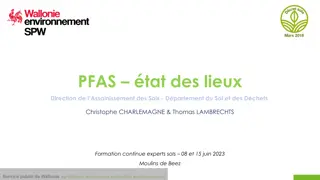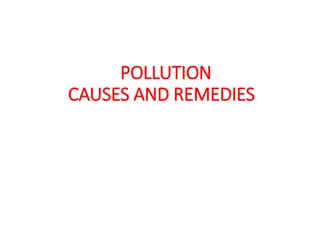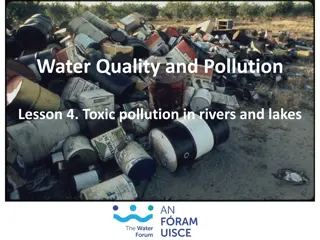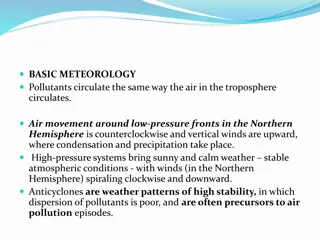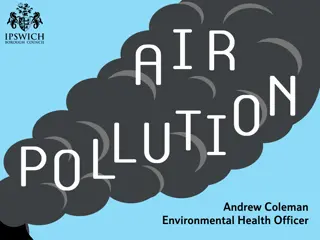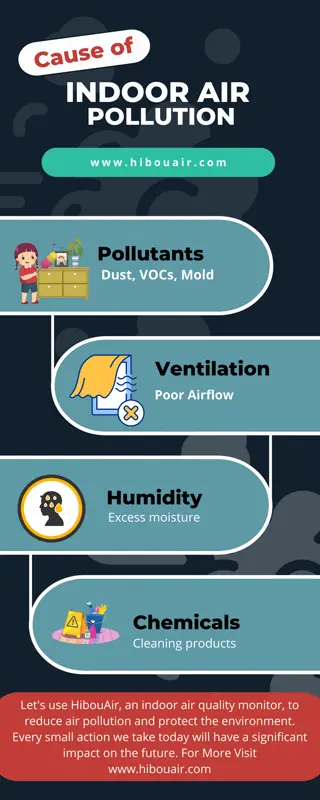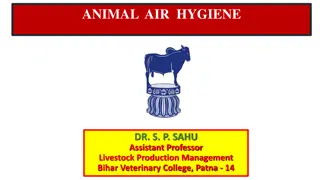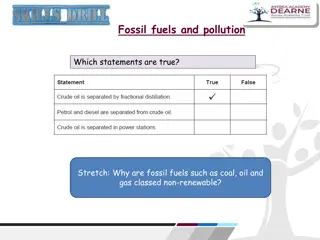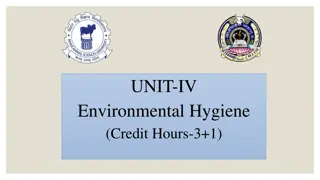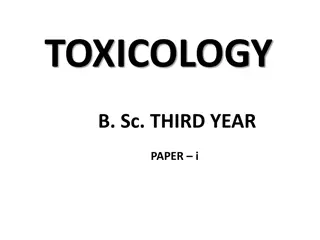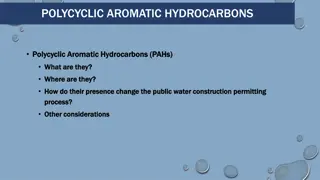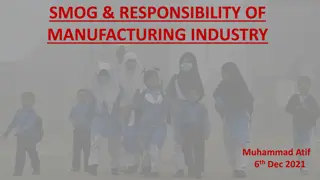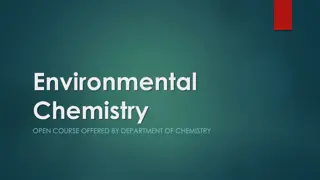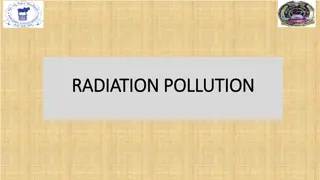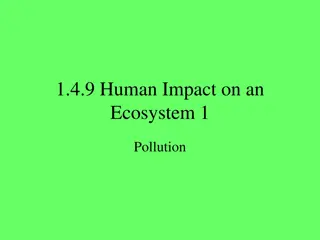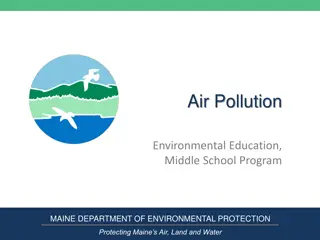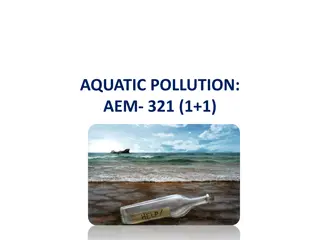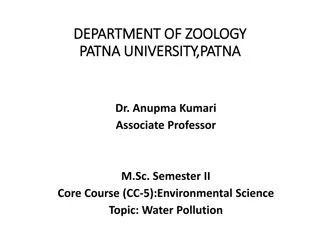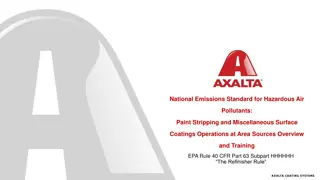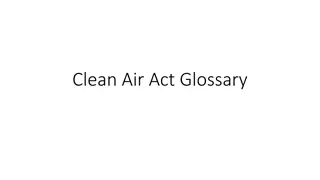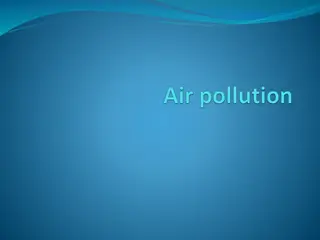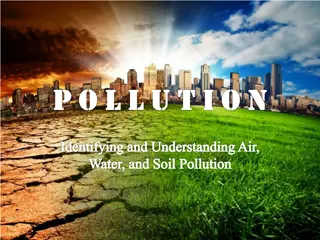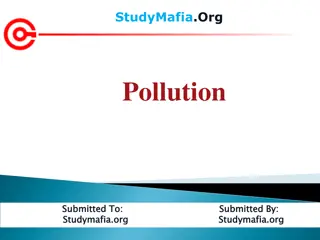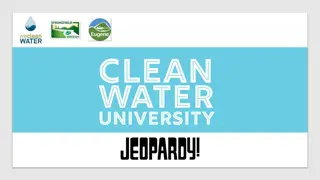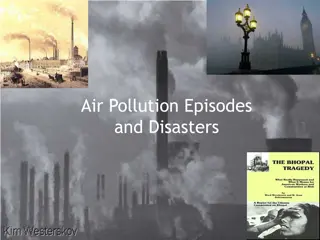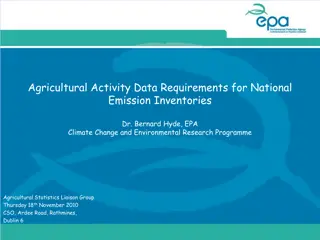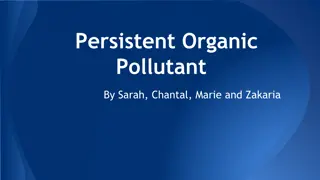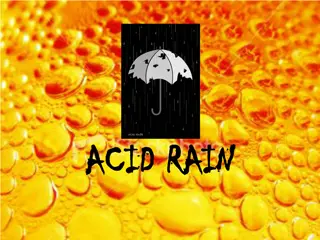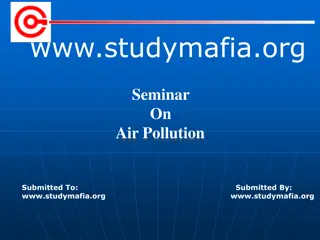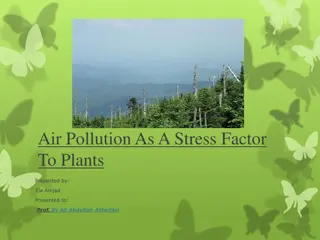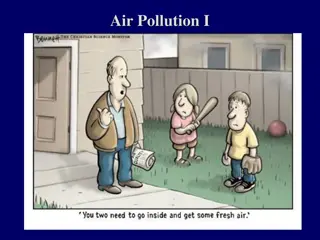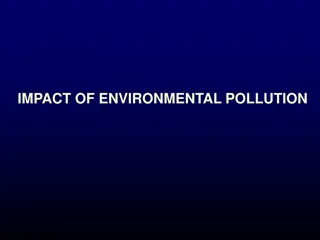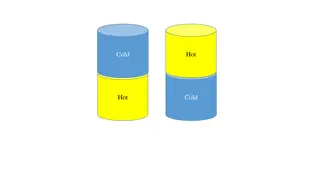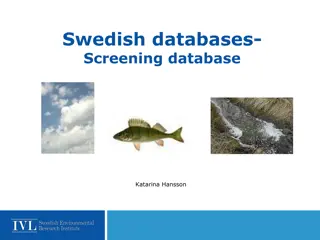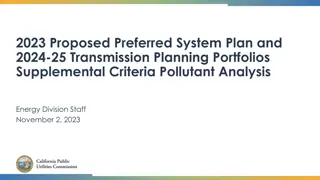PFAS: State of the Soil Remediation Experts Training
The training session on PFAS (per- and polyfluoroalkyl substances) focuses on the complex family of pollutants, their nomenclature, major categories, and associated risks in various industries. Experts will explore the implications of PFAS contamination and receive recommendations for addressing the
0 views • 20 slides
Understanding Pollution: Causes, Effects, and Remedies
Pollution, whether natural or manmade, refers to undesirable changes in the environment that impact air, water, and land, affecting human life and natural resources. Various pollutants like carbon monoxide, sulfur dioxide, and nitrogen dioxide contribute to air pollution, which can have harmful effe
2 views • 17 slides
Understanding Pollution and its Impacts: A Comprehensive Overview
This comprehensive guide delves into the vocabulary of pollution, toxicology, and exposure levels to toxic chemicals. It explains the different measurements for expressing contaminant levels in food and water, major types of air pollutants, primary and secondary pollutants, and the formation of phot
7 views • 37 slides
Understanding Toxic Pollution in Rivers and Lakes
Toxic pollution in rivers and lakes is a pressing environmental issue caused by various pollutants such as metals, pesticides, chemicals, and microbial contaminants. These pollutants can have detrimental effects on aquatic life, human water use, and health. Learn about the impact of toxic pollutants
2 views • 20 slides
Understanding Basic Meteorology Concepts for Air Quality Management
Pollutants circulate in the troposphere following air movement patterns around low-pressure fronts and high-pressure systems. Anticyclones and cyclones play a crucial role in atmospheric stability and pollutant dispersion. The relationship between lapse rates determines air stability and pollutant d
0 views • 24 slides
Clean Air Awareness Campaign: Myths vs. Facts
Learn about the importance of reducing vehicle idling, the harmful effects of pollutants like nitrogen dioxide and particulates, and busting myths around idling and its impact on air quality. Discover ways to promote clean air and create your own Clean Air Superhero in this engaging informational co
1 views • 14 slides
Causes of Indoor Air Quality
Common indoor air pollutants such as dust, VOCs, and mold, along with poor ventilation, excess humidity fostering mold growth, and chemicals from cleaning products, significantly impact indoor air quality. Managing these factors is essential for crea
3 views • 1 slides
Understanding Livestock Air Quality Management
Livestock air hygiene is crucial for animal welfare and production. Factors like emissions, pollutants, and ventilation impact air quality in confined feeding operations. Improving air quality benefits animals, workers, and the environment by reducing harmful emissions and enhancing productivity.
0 views • 17 slides
Understanding Fossil Fuels and Pollution: A Comprehensive Overview
Fossil fuels such as coal, oil, and natural gas are non-renewable energy sources that release heat energy when burned, but also contribute to pollution when not burned completely. This leads to the release of harmful pollutants like carbon dioxide, carbon monoxide, sulfur dioxide, and carbon particu
2 views • 9 slides
Understanding Environmental Hygiene: Air Pollution and Composition of Air
The content delves into the concept of atmospheric pollution, the composition of pure and impure air, sources of air pollution, and the zones of the atmosphere. It highlights the detrimental effects of pollutants on health and the environment, emphasizing the importance of environmental hygiene. The
1 views • 27 slides
Introduction to Toxicology: Science and Impact on Living Organisms
Toxicology is the study of adverse effects of chemicals on living organisms. It assesses probability of occurrence, quantitatively and qualitatively analyzing toxic effects. Toxicants are agents causing harmful responses in biological systems. Environmental toxicology focuses on pollutants' effects
0 views • 12 slides
Understanding Polycyclic Aromatic Hydrocarbons (PAHs) and Their Impact
Polycyclic Aromatic Hydrocarbons (PAHs) are ubiquitous environmental pollutants found in nature and from human activities like combustion. They affect public water construction permitting processes by influencing material standards. PAHs can be harmful concerning health when soils are disturbed duri
0 views • 6 slides
Understanding Smog and Its Impact on Health and Environment
Smog is a result of air pollution caused primarily by the burning of fuels in industries and vehicles. It is formed when sunlight reacts with pollutants in the atmosphere. There are two main types of smog: sulfurous and photochemical. Smog poses serious health risks, leading to respiratory issues, a
1 views • 10 slides
Environmental Chemistry Open Course: Understanding Pollution and Control Measures
Dive into the world of environmental chemistry with this comprehensive open course offered by the Department of Chemistry. Explore the causes, effects, and control measures of air, water, soil, noise, thermal, light, and radioactive pollutions. Gain insights into pollution terminology, water quality
3 views • 9 slides
Understanding Radiation Pollution and Its Effects
Radiation pollution, whether ionizing or non-ionizing, is a significant environmental concern. Ionizing radiation can penetrate tissues and cause damage to living cells, while non-ionizing radiation may effectively sterilize microbes. Sources of radiation include cosmic rays, terrestrial elements li
0 views • 15 slides
Understanding Pollution and its Ecological Impact
Pollution is any human addition to the environment that disrupts the ecosystem's ability to sustain life. This includes pollutants like CO2 and chemicals from various sources that harm air, water, and land. Different types of pollution such as industrial, agricultural, and domestic pollution have ad
0 views • 25 slides
Understanding Air Pollution and Its Impact on Health and Environment
Air pollution poses a significant threat to human health, the environment, and the economy. The Clean Air Act has played a crucial role in reducing air pollutants since its establishment in 1963. Criteria air pollutants such as ozone, particle pollution, carbon monoxide, lead, sulfur dioxide, and ni
1 views • 11 slides
Genetic Manipulation in Environmental Biotechnology
Genetic manipulation strategies in environmental biotechnology involve techniques like gene splicing and molecular cloning to modify genes directly. These methods have various applications such as isolating genes, producing specific molecules, improving biochemical production, creating organisms wit
0 views • 20 slides
Understanding Aquatic Pollution and Its Impact on Water Quality
Aquatic pollution is a significant concern affecting the environment and human health. It includes various pollutants entering water bodies from land-based activities, causing harm to aquatic life and humans. Pollution sources can be classified into point source and non-point source. Monitoring wate
2 views • 13 slides
Understanding Pollution Impact on Watersheds
The content covers the impact of human activities on watersheds, focusing on pollutants like oil, nutrients, and bacteria. It emphasizes the importance of protecting watersheds and offers solutions to prevent pollution. Examples include oil runoff affecting drinking water sources and nutrient pollut
0 views • 7 slides
Understanding Air Pollution and Respiratory Health
Explore the impact of air pollution on respiratory health, learning about the Air Quality Health Index, importance of green spaces, lungs function, and the role of rain in clearing pollutants. Discover how wind conditions affect air quality and why children and parents need to monitor daily air qual
0 views • 34 slides
Understanding Water Pollution and Its Impact on the Environment
Water pollution is a significant environmental issue caused by the contamination of water bodies with toxic substances like chemicals and microorganisms. This degradation in water quality poses risks to both humans and ecosystems. The pollutants stem from various sources such as agricultural runoff,
0 views • 59 slides
EPA Rule 40 CFR Part 63 Subpart HHHHHH Overview
EPA Rule 40 CFR Part 63 Subpart HHHHHH, also known as The Refinisher Rule, sets standards for hazardous air pollutants in paint stripping and surface coatings operations. The rule aims to control emissions of target hazardous air pollutants in collision centers and surrounding areas. It outlines req
0 views • 20 slides
Overview of Clean Air Act: Criteria Pollutants, NAAQS, HAPs, VOCs
The Clean Air Act establishes standards for criteria pollutants like ozone and particulate matter to protect human health. NAAQS set uniform air quality goals, while Hazardous Air Pollutants (HAPs) pose threats such as cancer. Volatile Organic Compounds (VOCs) and National Emission Standards for HAP
0 views • 26 slides
Understanding Air Composition and Pollution
The composition of the dry atmosphere by volume, primary and secondary pollutants, and the impact of human activities on air quality are discussed. Various gases present in the atmosphere, sources of pollution, and the belief that natural elements are clean until polluted are explored. Different nat
0 views • 31 slides
Understanding Air Pollution: Causes, Impacts, and Solutions
Air pollution is a pressing issue caused by human activities like industrial emissions and transportation. It poses significant health risks to both individuals and the environment. This comprehensive guide delves into the history, primary and secondary pollutants, urban vs. rural impacts, and major
0 views • 39 slides
Understanding Pollution: Types, Causes, and Impacts
Pollution is the introduction of harmful substances or energy into the environment, leading to adverse changes in living entities. It can be caused by various factors such as chemical pollutants and energy forms like sound and light. This article discusses different types of pollution including air,
0 views • 25 slides
Understanding Water Management in Urban Areas
Explore the journey of rainwater as it traverses streets, picking up pollutants, leading to its ultimate destination. Learn about the impact of pollutants like dog poop, fertilizers, and chemicals on water bodies. Discover the importance of water quality metrics, nutrients in soaps affecting waterwa
0 views • 33 slides
Industrial Air Pollution Disasters in History
The Meuse Valley disaster in Belgium in 1930 and the Donora incident in Pennsylvania in 1948 were two significant episodes of air pollution disasters caused by industrial activities. These events led to multiple casualties and serious health effects due to toxic smog containing pollutants like SO2.
0 views • 31 slides
Agricultural Emission Inventory Data Reporting Requirements
This presentation discusses the data requirements for national emission inventories in the agricultural sector, covering greenhouse gas inventories, air pollutant inventories, National Inventory Reports, Large Combustion Plant Directive, National Emission Ceilings Directive, livestock emissions, and
0 views • 13 slides
Understanding Persistent Organic Pollutants and Their Impact
Persistent Organic Pollutants (POPs) are chemical substances that remain in the environment, bioaccumulate through food chains, and pose risks to human health and the environment. Examples include pesticides like DDT, industrial pollutants such as PCBs, and unintentional by-products like dioxins. In
0 views • 30 slides
Understanding Acid Rain and Its Impact
Acid rain, formed by pollutants like sulfur dioxide and nitrous oxides combining with water in the atmosphere, lowers the pH of rainwater and can lead to soil and water acidification. This type of precipitation can harm plants by washing away essential nutrients, releasing toxic metals, and inhibiti
0 views • 22 slides
Understanding Air Pollution: Causes, Effects, and Solutions
This seminar on air pollution delves into the various pollutants found in the air, how they are measured using the Air Quality Index, and their effects on health. It discusses different types of pollutants like carbon monoxide and highlights the importance of monitoring air quality to protect public
1 views • 33 slides
Understanding Air Pollution Stress on Plants
The impact of air pollution on plants is a significant concern, affecting their physiology and overall health. Various air pollutants, such as sulfur dioxide, ozone, and nitrogen compounds, have been identified as phytotoxic agents, leading to severe or subtle effects on plant life. Detecting the ef
0 views • 21 slides
Historical Overview of Air Pollution: From London Smog to Modern Sources
Explore the history of catastrophic air pollution events dating back to 1911 in London, highlighting the impacts on public health. Learn about the major classes of air pollutants, their sources, and effects, along with key test questions related to air quality and pollution control measures. Delve i
0 views • 32 slides
Understanding the Impact of Environmental Pollution
Environmental pollution, caused by the introduction of contaminants into the air, water, and soil, has detrimental effects on ecosystems and human health. This pollution includes air pollution from various sources like combustion and industrial processes, leading to the formation of harmful pollutan
0 views • 61 slides
Ocean Pollution Jeopardy: Key Facts and Pollutants Impact
Explore the devastating impact of pollutants on oceans through a Jeopardy-style game showcasing key facts about plastic pollution, offshore facilities, waste disposal, sea turtle endangerment, and common ocean trash items. Learn about the Great Pacific Garbage Patch, plastic island formation, and th
0 views • 27 slides
Understanding Atmospheric Inversions and Air Quality Impact
Explore the effects of atmospheric inversions on air quality, particularly during wildland fires. Learn about stable and unstable air conditions, how pollutants behave in different scenarios, and where they disperse. Discover the impact of temperature inversions on smoke movement and the importance
0 views • 6 slides
Environmental Monitoring and Screening Databases in Sweden
This content delves into the monitoring and screening databases managed by Katarina Hansson at IVL, focusing on chemicals, emissions, and national environmental data in Sweden. It covers the use of national databases, biota databases for pollutants in biological samples, and screening studies involv
0 views • 10 slides
Criteria Pollutant Analysis for California's Electric Sector Planning
The analysis focuses on minimizing air pollutants and greenhouse gas emissions, with a priority on disadvantaged communities, as directed by California's Public Utilities Commission. It includes quantifying criteria pollutants within and outside of Disadvantaged Communities (DACs) for the years 2026
0 views • 15 slides
